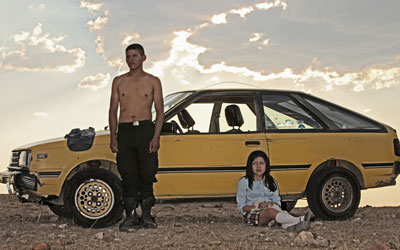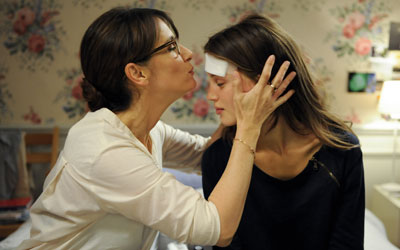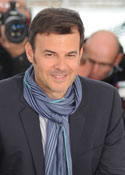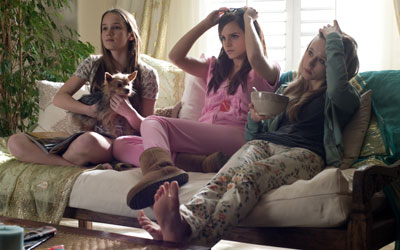Ozon, Coppola win over Cannes with tales of teens behaving badly
It’s not uncommon for a film at Cannes to send critics rushing for the exit before the credits roll – but it doesn’t usually happen at the first press screening of the competition.
On Wednesday night, though, around 45 minutes into Amat Escalante’s elegantly made, relentlessly grim Mexican drama “Heli”, there was a mini-exodus toward the back exit.
The reason? A realistic-looking (and sounding) snap of a dog’s neck at the hands of a vicious paramilitary officer.
About 15 minutes later, another crowd of journalists huffed and puffed their way out of the screening room, this time at the horrific sight of a hostage’s genitals being set on fire.
Fair enough.

Amat Escalante's "Heli"
“Heli”, about the impact of drugs and violence on one family’s already bleak existence, is one of those skilfully crafted, unflinching works (common at Cannes and other international film festivals) that nevertheless leaves you questioning what the point of all the queasiness might be. In other words, after squirming and shielding his or her eyes through entire sequences, what is a viewer left with?
“Heli” is hard to dismiss, but it may be even harder to defend.
Ozon triumphs
Much easier to like was the competition entry screened Thursday morning: François Ozon’s tender, slyly funny and splendidly shot “Jeune et jolie” (“Young and Pretty”), a portrait of an adolescent prostitute that is easily the director’s best work since “Swimming Pool” (2003).

Geraldine Pailhas, left, and Marine Vacth in François Ozon's "Jeune et jolie" ("Young and Beautiful")
Revolving around Isabelle, a ravishing 17-year-old Parisian (played by Marine Vacth) who leads a double life as high-schooler and high-class call girl, the film observes the young woman’s sexual awakening, the time she spends with clients, and the consequences of her actions with a fine-tuned sense of irony, real depth of feeling, and not a shred of judgement.
Wisely, Ozon never provides any explicit psychological explanation for how or why Isabelle, who comes from a well-off family presided over by a loving mother (the terrific Geraldine Pailhas), slips into prostitution. One of the movie’s most unsettling and provocative ideas is, in fact, that such a transgression could actually be easy for a young woman who is so consistently an object of desire. Ozon introduces Isabelle through the prism of the male gaze (her younger brother watching her as she lies on a beach in the opening shot), and he often frames her face against dark or deep-toned backgrounds to highlight her singular beauty.
 Indeed, the filmmaker (pictured left) suggests that Isabelle’s physical appearance and her awareness of its effect on people make her intolerant of ordinary adolescent life; when we see her visibly bored and estranged from her classmates (with the exception of one loyal girlfriend), we sense her impulse to experience something beyond the average, daily routine.
Indeed, the filmmaker (pictured left) suggests that Isabelle’s physical appearance and her awareness of its effect on people make her intolerant of ordinary adolescent life; when we see her visibly bored and estranged from her classmates (with the exception of one loyal girlfriend), we sense her impulse to experience something beyond the average, daily routine.
Ozon uses a “double” motif to develop the notion that for Isabelle, sex and prostitution offer a form of escapism from, or transcendence of, banality. As she loses her virginity to a handsome German on holiday, Isabelle turns her head only to see a fully clothed version of herself watching from afar (a classic “Ozonian” moment), and during several of her encounters with clients, mirrors show her reflection. Isabelle, perhaps, is using her sexuality to get outside of her everyday skin, to become another version of herself.
 Anyone thinking the lead actress (right) is going to be another pouty Gallic bombshell is in for a surprise. Vacth turns in an exquisitely modulated, expressive performance that embodies the film’s compassionate vision of a young woman navigating treacherous waters.
Anyone thinking the lead actress (right) is going to be another pouty Gallic bombshell is in for a surprise. Vacth turns in an exquisitely modulated, expressive performance that embodies the film’s compassionate vision of a young woman navigating treacherous waters.
And after a few middling efforts and the solid but over-praised “In the House”, Ozon, too, proves he is capable of confounding expectations. If it looks at first like a clinical, quintessentially French study of sexuality and desire, “Jeune et jolie” ventures into gratifyingly risky territory when it ponders the impact of Isabelle’s choices on those around her. It is to the director’s great credit that the film never turns moralistic, its mysteries deepening as it heads toward its haunting conclusion.
Coppola’s light look at a dark story
More teens behaving badly can be found in Sofia Coppola’s “The Bling Ring”, which opened the “Un Certain Regard” side category with a generous dose of pizzazz and a good deal of dark humour.

Sofia Coppola's "The Bling Ring"
Inspired by the true story of a group of wealthy LA teens who broke in to celebrity homes in 2008 (Paris Hilton and Lindsay Lohan were two of the chosen few), making off with three million dollars in clothes, jewellery and accessories, the film finds the writer-director working in a lighter register than usual.
 Eschewing the languorous rhythms and visual lyricism of her previous work, Coppola has crafted a fast-paced caper about vapid youth obsessed with wealth and notoriety (leading the attractive cast are a very fine Katie Chang, Israel Broussard, and Emma Watson of “Harry Potter” fame, right, doing a delicious take on Valley Girl cadences).
Eschewing the languorous rhythms and visual lyricism of her previous work, Coppola has crafted a fast-paced caper about vapid youth obsessed with wealth and notoriety (leading the attractive cast are a very fine Katie Chang, Israel Broussard, and Emma Watson of “Harry Potter” fame, right, doing a delicious take on Valley Girl cadences).
Still, the director’s personal touch is there, not just in the tale of pretty, privileged young people adrift–one of her pet themes–but also in the anthropological attention she brings to their expressions, mannerisms, and poses. “The Bling Ring” is filled with snappy dialogue (it’s by far the chattiest of Coppola’s films) and gorgeously choreographed sequences of night-club bacchanals, shopping sprees, and, of course, the burglaries. Coppola uses slow-mo and a soundtrack full of pop and hip-hop hits (Sleigh Bells, Kanye West, Frank Ocean) to give the film a kinetic force, even if it doesn’t cut very deep or go very far.
“The Bling Ring” is a decidedly less searching, poignant work than we’re accustomed to from Coppola. It doesn’t envelop you in its characters’ moods or make you feel for them (the closest it comes is through Broussard’s mild-mannered, insecure gay teen, who has a fleeting, but potent moment of emotion when cops arrive at his bedroom door).
But it’s okay for a director as uniquely talented as Coppola to mix it up and do something less ambitious. Moreover, unlike her grievously underrated 2006 competition entry “Marie Antoinette”, “The Bling Ring” won approving applause at its press screening – and almost no one left before the closing credits rolled.





1 Comments
Post new comment